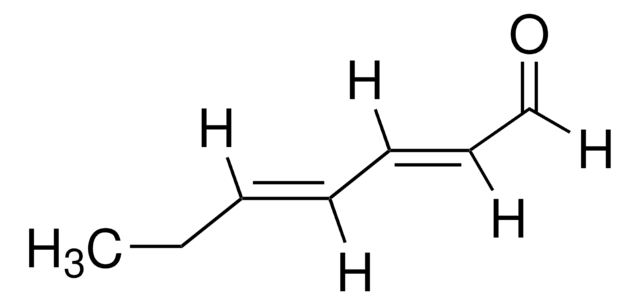W346101
2-Isopropylphenol
≥98%, FG
Sinónimos:
2-propan-2-ylphenol, O-cumenol, Prodox 131
About This Item
Productos recomendados
biological source
synthetic
grade
FG
Fragrance grade
Halal
agency
follows IFRA guidelines
meets purity specifications of JECFA
reg. compliance
EU Regulation 1223/2009
EU Regulation 1334/2008 & 872/2012
FDA
vapor pressure
<0.05 mmHg ( 25 °C)
assay
≥98%
refractive index
n20/D 1.526 (lit.)
bp
212-213 °C (lit.)
mp
12-16 °C (lit.)
density
1.012 g/mL at 25 °C (lit.)
application(s)
flavors and fragrances
documentation
see Safety & Documentation for available documents
food allergen
no known allergens
fragrance allergen
no known allergens
organoleptic
medicinal
SMILES string
CC(C)c1ccccc1O
InChI
1S/C9H12O/c1-7(2)8-5-3-4-6-9(8)10/h3-7,10H,1-2H3
InChI key
CRBJBYGJVIBWIY-UHFFFAOYSA-N
Gene Information
human ... GABRA1(2554)
¿Está buscando productos similares? Visita Guía de comparación de productos
Categorías relacionadas
signalword
Danger
hcodes
Hazard Classifications
Acute Tox. 4 Oral - Eye Dam. 1 - Skin Corr. 1B
Storage Class
8A - Combustible corrosive hazardous materials
wgk_germany
WGK 3
flash_point_f
224.6 °F - closed cup
flash_point_c
107 °C - closed cup
ppe
Faceshields, Gloves, Goggles, type ABEK (EN14387) respirator filter
Certificados de análisis (COA)
Busque Certificados de análisis (COA) introduciendo el número de lote del producto. Los números de lote se encuentran en la etiqueta del producto después de las palabras «Lot» o «Batch»
¿Ya tiene este producto?
Encuentre la documentación para los productos que ha comprado recientemente en la Biblioteca de documentos.
Nuestro equipo de científicos tiene experiencia en todas las áreas de investigación: Ciencias de la vida, Ciencia de los materiales, Síntesis química, Cromatografía, Analítica y muchas otras.
Póngase en contacto con el Servicio técnico










